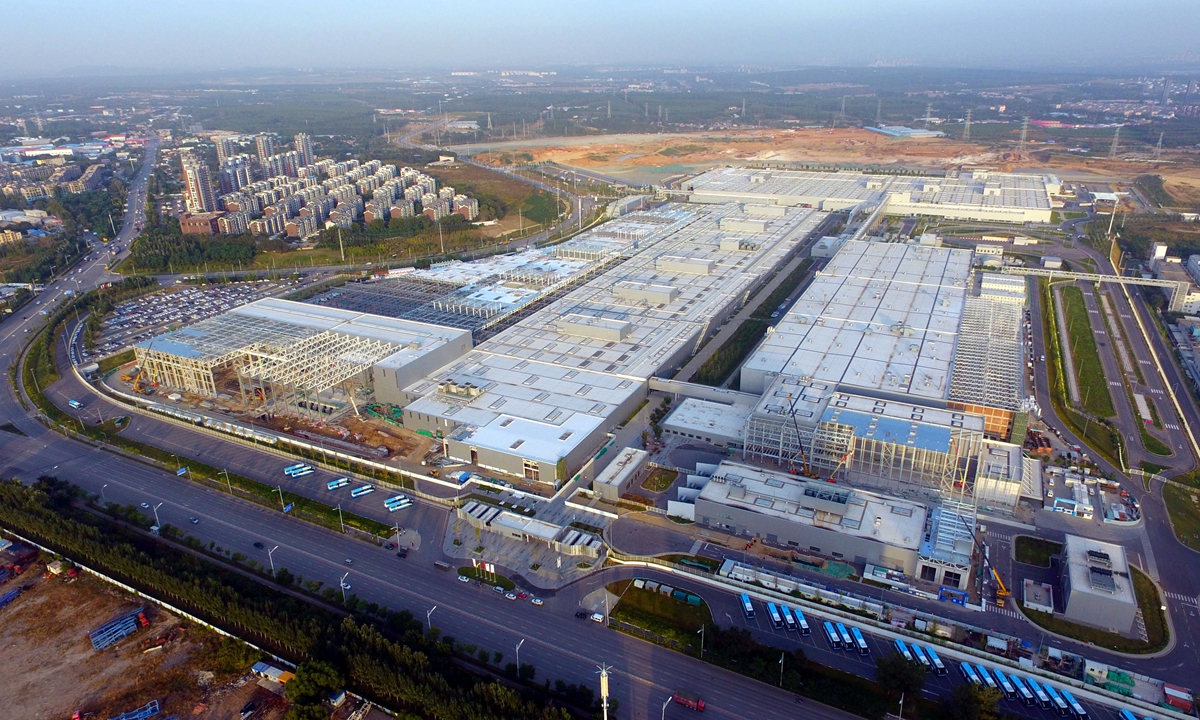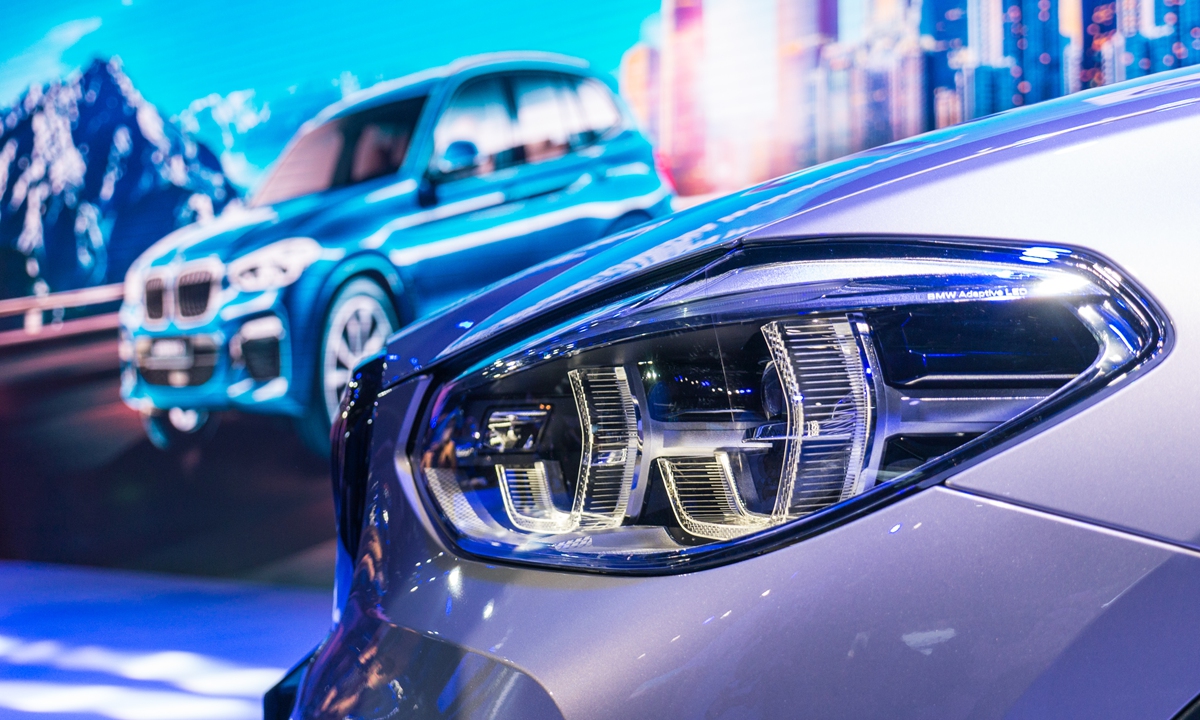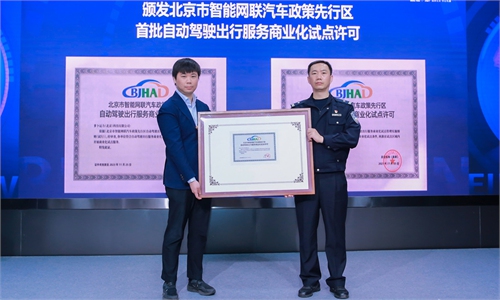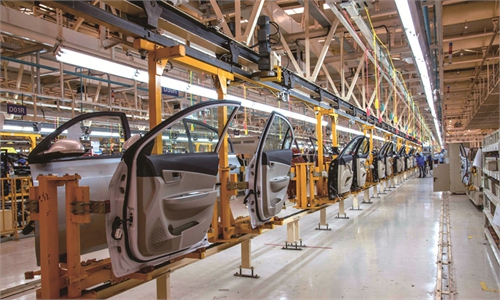Equity game between Chinese, foreign auto players starts following removal of ownership cap
Auto brands with lackluster performance set to wind down: analysts

BMW Brilliance Automotive's plant in Shenyang, Northeast China's Liaoning Province File photo: VCG
A redline limiting foreign automakers to have no more than 50 percent share in a joint venture (JV) - a framework that has remained for decades for foreign players seeking to establish an auto firm in China - will finally meet its end at the beginning of 2022, signaling the country's commitment and unwavering effort to open up larger parts of its economy to foreign investment.According to a document issued on Monday by the Ministry of Commerce and the National Development and Reform Commission (NDRC), the country's top economic planner, China will allow full foreign ownership of passenger car manufacturing firms beginning January 1, 2022.
In order to ensure carmakers remained competitive, China imposed ownership restrictions in 1994, limiting foreign carmakers to owning no more than a 50 percent share of any local JV.
The industry policy remained in place until 2018 when the NDRC announced further reform within the auto industry: it would remove foreign ownership caps for companies producing fully electric and plug-in hybrid vehicles in 2018, for makers of commercial vehicles in 2020, and the wider passenger car market by 2022, reflecting that China has gradually peeled back limits on foreign ownership in the domestic auto industry.
As the new policy will soon take effect, which side will take the first move? Foreign automakers or their domestic partners? Industry observers believe three results are possible: both sides maintaining the status quo, foreign players increasing their share in the JV or domestic firms taking the initiative.
"The equity game is on in earnest," Wang Cun, director of the China Automobile Dealers Association's import committee, told the Global Times on Monday. "It needs negotiation for a period and equity allocation will hinge on each contribution to the JV."
According to Wang, luxury auto brands like German BMW and Mercedes-Benz are likely to move first based on their strong brand power and high technology level, which have led to their dominant positions in the JV relationship.
As early as 2018, BMW said it would pay 3.6 billion euros ($4.2 billion) in 2022 for a further 25 percent stake in the venture with Brilliance - its main JV in China - adding to its existing 50 percent holding and giving it the control of BMW Brilliance Automotive (BBA).
BMW became the first foreign-controlled fuel passenger car company.
"Over the past 18 years, BMW has successfully developed its activities in China based on the great support of local and national authorities and on the close win-win partnership with Brilliance. The political commitment by [Northeast China's] Liaoning Province and its capital city Shenyang is the cornerstones of BMW's success in China," the German automaker said in a statement sent to the Global Times on Tuesday.
"BMW welcomes China's action to further market opening and reforms. Please understand that we can't provide more details by now," the firm added.
The equity tug-of-war between state-owned BAIC and Daimler, owner of the Mercedes-Benz brand, has lasted for a long time. It was reported by Reuters in 2019 that Daimler had sought to increase its shareholding in Beijing Benz Automotive Co.
In 2020, Beijing Benz achieved revenues of 169.69 billion yuan ($26.64 billion), accounting for 96 percent of BAIC's total revenue. The JV was thus dubbed BAIC's "cash cow."
"But I think, for the majority of JVs, they won't take a quick move right after the renewed opening-up policy as there are still long-time contracts there," said Wang.
A spokesperson for Japanese automaker Toyota told the Global Times on Monday that currently it has no plan to explore new local partners or seek to establish a solely-owned facility in China.
Toyota has two Chinese state-owned automaker partners - FAW Group and GAC Group.
Outlook darkens for some JVs
In comparison to the luxury segment, some JVs that produce middle- and low-end foreign vehicles have scaled down over recent years, even struggling to survive in the China market.
Japanese minicar maker Suzuki Motor ended its alliance with Chongqing Changan Automobile in 2018 after 25 years of cooperation, citing China's preference for larger vehicles.
On August 30 this year, the 16-year-old JV FAW-Mazda said farewell to the Chinese market. According to a plan, the JV, established in 2005 and famed for models including the Mazda 6 sedan, will no longer exist.
Cases like Suzuki and Mazda have reflected that the period for JVs to enjoy the dividends in the Chinese auto market has already gone. "As brand differentiation intensifies, many companies are struggling on the verge of restructure or elimination by the market," Cui Dongshu, secretary general of the China Passenger Car Association (CPCA), told the Global Times.
The overall performance of China's JV passenger car companies this year has been poor, not only in the new-energy vehicle (NEV) sector but also the traditional fuel car market due to supply constraints, according to Cui.
In November, mainstream JV brands recorded retail sales of 780,000 vehicles, down by 23 percent year-on-year, CPCA data showed. Even leading JVs such as FAW-Volkswagen and SAIC-Volkswagen have seen their sales fall by 40.2 percent and 24.9 percent year-on-year, respectively.
"In the Chinese auto market, the world's largest, which is becoming increasingly competitive, we can see that domestic auto brands like BYD and Geely have grown up and they are chipping away the market share of some JV brands," Wang said.

A BMW model on display File photos: VCG
New battlegroundEarlier than the opening up in the overall passenger car sector, China scrapped foreign ownership limits on NEV manufacturers in 2018.
In July 2018, US electric giant Tesla announced it would enter the Chinese market and establish the first fully-foreign owned car plant in the country.
It is worth noting that a number of foreign-funded firms and JVs are increasing deployment of NEVs in China, vying to release their new strategies.
"The product layout of JVs has improved in the NEV sector and their pricing strategy is also constantly putting pressure on domestic brands," said Cui.
Last year, Mercedes-Benz and Geely announced that they have formally established a global JV for the smart brand, aiming to transform smart into a leading player in premium-and intelligent electrified vehicles.
In 2019, BMW partnered with Great Wall Motor to drive e-mobility forward by building a joint plant in China, where BMW will produce future fully-electric models of its MINI brand.




